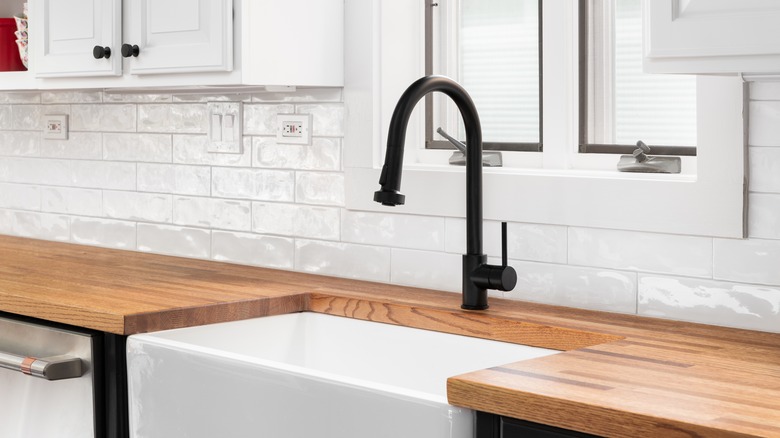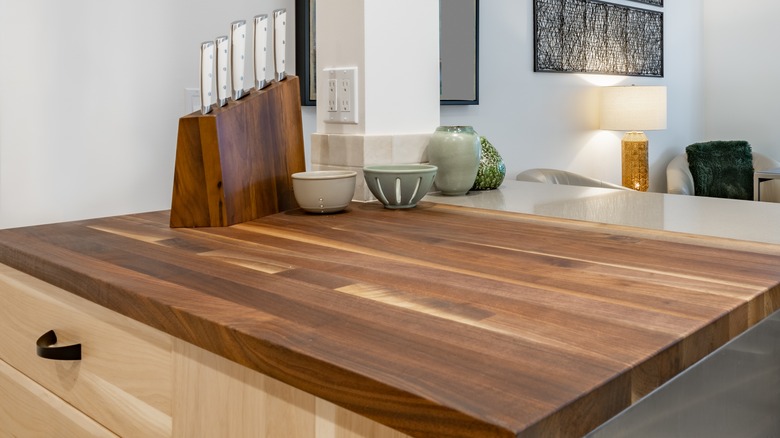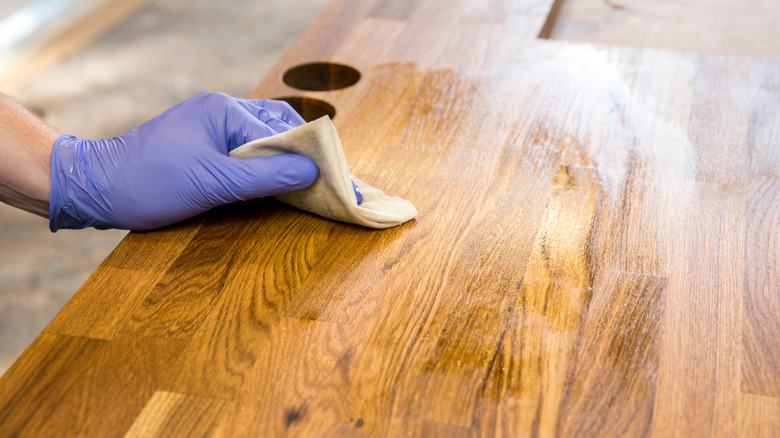How Long Do Butcher Block Countertops Last Before They Need To Be Replaced?
Inspired by the original tool used by butchers and blacksmiths alike, butcher block countertops are just one style of wooden countertop that has worked its way into American homes over the years. The style takes after its centuries-old predecessor by giving its users a durable, sturdy surface to perform daily kitchen tasks while also allowing for easy cleanup and upkeep. Longevity is important to consider when selecting new countertops, as you'd want your counters to avoid warping and discoloration for as long as possible before needing replacement. Well, the good news is — butcher block countertops may last up to 20 years or more, so long as they're properly cleaned in between uses and cared for over time.
Butcher block counters are a popular feature among homeowners because of their affordability and how easy they are to install and maintain. Although butcher block counters don't normally last as long as countertops made of natural stone, the style fares well in most kitchens, creating a warm and inviting atmosphere similar to that seen in farmhouses or ranch-style homes. And with contractors able to create the style using various types of wood, no two variations of butcher block countertops look the same. Here's more on the durability and longevity of butcher block countertops, as well as how to ensure they stay in pristine condition for as long as possible.
What makes butcher block countertops durable?
Just like the traditional butcher blocks that are still used in both commercial and private kitchens today, butcher block countertops are made of thin wooden strips connected using glue and excessive amounts of pressure. The wood type, thickness, and the technique utilized to fuse the individual pieces all have an impact on the countertops' overall durability and longevity. Virtually any type of wood can be used to make butcher block countertops, but walnut, maple, and oak are among the most popular, mostly due to their strength. Typical styles usually measure 1.5 to 2 inches thick, but thicker counters are even more capable of withstanding wear and tear.
Butcher block countertops are also extremely customizable, meaning buyers have many opportunities to modify the wooden pieces to match their ideal aesthetic before a contractor installs them. However, each of these modifications may come at a higher price. Unsurprisingly, stronger and higher-quality craftsmanship will cost homeowners more than designs using cheaper and weaker materials. Expect custom-made butcher blocks to cost between $50 and $150 per square foot to install, more expensive than some granite styles, but not as costly as the finest varieties of natural stone.
How to maintain butcher block countertops
A potential downside to installing butcher block countertops is the fact that they're generally more sensitive to damage than their natural stone counterparts. Even after a protective sealant is applied to the surface, homeowners should take caution when cleaning wooden counters or using them to prep or cook meals since the wood underneath can still shrink, expand, or even rot when exposed to liquids, moisture, or temperature changes. However, this can often be prevented by minimizing contact when working with liquids and cleaning spills immediately after they occur.
Butcher block countertops are also more susceptible to damage caused by knives and other sharp kitchen tools. Although it may be tempting to treat your wooden countertops as you would a cutting board, doing so may leave tiny, permanent indentations or scratches along the surface. For maintenance, applying oil to your butcher block counters in place of polyurethane helps condition the wood and keeps it from cracking or drying out. When oiling your countertops, do so with a soft cloth around every two to four weeks. However, avoid using cooking oils on your counters, like olive, coconut, or peanut oil. These formulas may sour and leave an unpleasant smell. Opt for a food-safe mineral oil instead.


